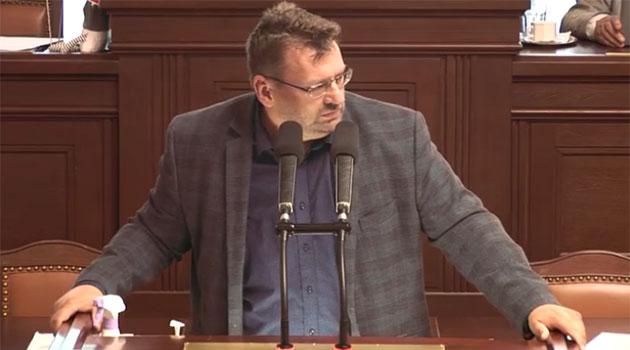Czech MP alleges during parliamentary debate on welfare bill that incest is part of Romani culture, open racism on the floor of the lower house

The Czech Chamber of Deputies has passed a bill that will apparently make it possible for impoverished people drawing welfare to lose part of their housing benefit and subsistence contribution if they repeatedly fail to pay fines for selected misdemeanors of a serious nature. The authorities would automatically deduct the unpaid fines from their benefits.
The bill, submitted by the opposition Civic Democratic Party (ODS), was approved after several hours of discussion that turned anti-Romani and racist at several junctures. The opposition Pirate Party failed to achieve rejection of the bill and MP Jan Čižinský of the Christian Democrats also failed to convince his fellow lawmakers to send the bill back to committee for a second reading.
The Senate will now assess the proposed legislation. Critics emphasized the necessity of undertaking social work with impoverished people instead of repressive measures.
ODS MP Petr Beitl said he believes “effective repression” is lacking from the welfare system at present. “This is a strong message to the people who do not value solidarity with the majority society,” MP Jan Bauer (ODS) said on behalf of those proposing the legislation.
“Problems in excluded localities will continue to escalate,” predicted Czech Labor and Social Affairs Minister Jana Maláčová (Czech Social Democratic Party – ČSSD) in her comments on the bill. Her party colleague MP Petr Dolínek said it was not possible to adopt what he called “anti-Romani laws”.
Beitl said he did not believe it was possible to prove the allegation that the bill is a racist one and that those making such claims shouldn’t waste their time. Pirate MP Mikuláš Ferjenčík criticized the bill by saying “We don’t want anybody to suffer as a consequence of the laws we adopt.”
Ferjenčík also said he is concerned that thefts will rise in the vicinity of excluded localities if the law is adopted. Other Pirate MPs made similar arguments.
According to MP František Navrkal, the living situations of socially excluded people should not be allowed to further deteriorate. “On the contrary, I believe we should work on getting them out of their complex social siutations,” he said.
“The more drastic the law, the more such [impoverished] people there will be,” argued MP Čižinský. However, most MPs defended the ODS bill.
According to Eva Fialová (ANO), the bill is aimed at those who ignore all the rules. “After all, we will not support this continually growing group who de facto believe nothing at all is required of them and who behave accordingly,” said MP Hana Aulická Jírovcová (Communist Party of Bohemia and Moravia – KSČM).
According to the chair of the MPs from the Christian Democrats (KDU-ČSL), Jan Bartošek, it is necessary to proceed against “a certain group” in the population in the way the bill proposes. MP Jaroslav Holík (“Freedom and Direct Democracy” – SPD) argued that “a certain group of people” could not be educated to follow the rules through further subsidies.
The director of the Institute for Social Inclusion, Martin Šimáček, has criticized the fact that even opposition MPs voted for the bill. “It’s difficult to say why the Christian Democrats and TOP09 voted for this anti-social law that will push thousands of the most impoverished households, including families with children, into absolute poverty,” he said.
Lubomír Volný: Romani parents systematically abuse their children, incest is part of Romani culture
MP Lubomír Volný gave a racist speech full of insults toward Romani men and women during the debate on the bill. Not only did he insult Romani people, but also other minorities, attacking the indigenous inhabitants of Australia, for example.
Together with his party colleague Marián Bojko, Volný also attacked the ROMEA non-governmental organization with various untruths. “Romani parents systematically, intentionally steal from their own children and exploit them as an income source,” he alleged on the floor of the lower house.
“Incest is an integral part of Romani culture,” was yet another racist remark made by Volný from the podium in the Chamber of Deputies. In another part of his speech he called for the building of new concentration camps for Romani people.
“What is it that bothers you all about a project for Romani quarters with a strong state presence? The presence of the state could be strong, the main headquarters of the Police of the Czech Republic would simply be in any given locality, like the headquarters of the Apache in the Bronx,” MP Volný proposed.
He also alleged that the ROMEA organization invents scams for Romani people to undertake. “Fake paternity. […] That’s another invention of ROMEA’s. You write down that your father is somebody who died last week, or a month ago, or two, and the child is automatically entitled to an orphan’s benefits,” MP Volný lied to the lower house.
The Civic Democrats had originally proposed that people should lose their entitlement to the category of welfare benefits called “aid to those in material distress” after committing three serious misdemeanors. They later adjusted the bill into the form that has now been adopted by the lower house.
According to the bill, the authorities would deduct the amount of unpaid fines for misdemeanors against public order, civic coexistence and against property from people’s welfare benefits. They would proceed similarly in cases where a guardian fails to register a child for compulsory school attendance or where a guardian fails to make sure a registered pupil regularly attends school.
People who fail to pay fines for violating any municipal decrees establishing the terms of holding local athletic or cultural events would also have those fines deducated from their benefits. For supporting and tolerating children’s truancy, according to the bill, the fine would be deducted on the first offense.
For other types of misdemeanors, the penalties could not be deducted from benefits until the third misdemeanor. However, a municipality would be able to request a deduction during a first or second misdemeanor if the concern were to arise that the penalty could not be enforced in any other way and that the perpetrator would likely expend just the bare minimum of effort to correct the situation.
After the announcement of such a case to the Labor Office, the deductions would have to be made before disbursing the benefits. The amounts not disbursed to welfare recipients would instead be sent to the relevant municipalities’ budgets to cover their unpaid fines.
